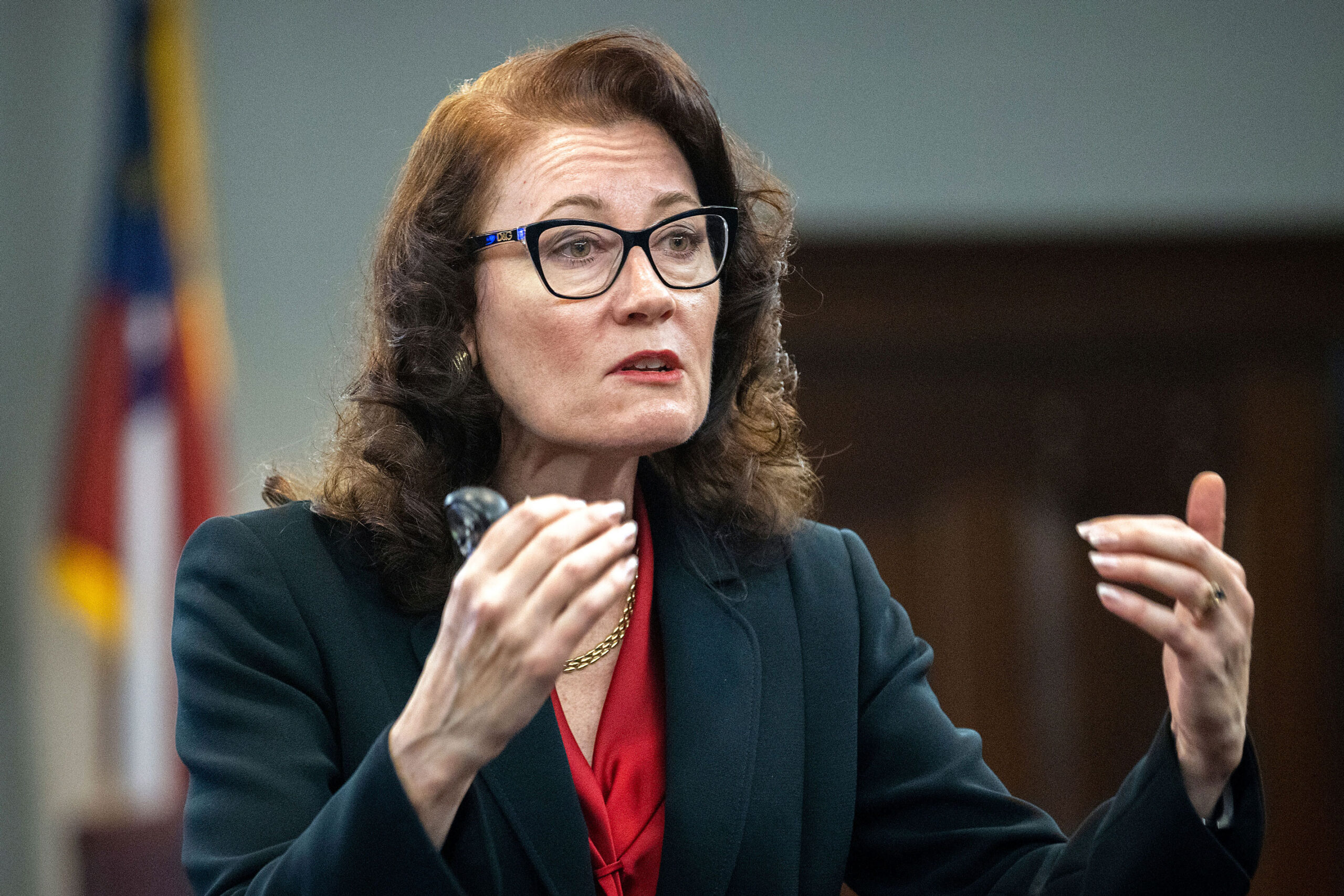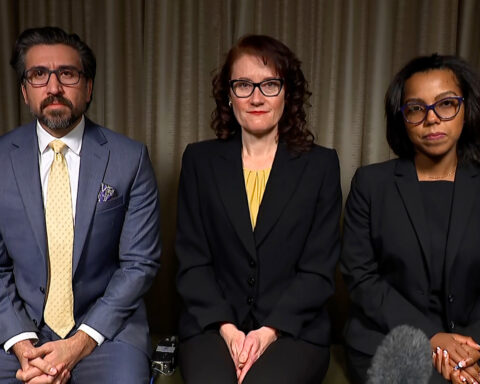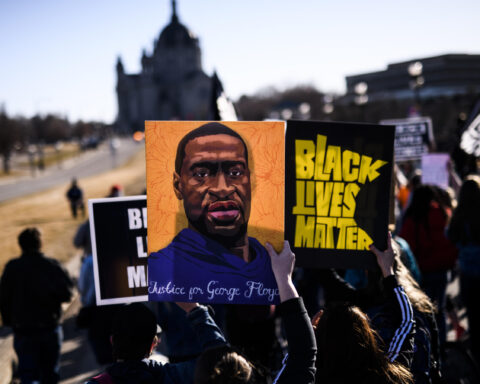Prosecutors will begin court proceedings Tuesday in the trial over the killing of Ahmaud Arbery with a rebuttal to closing arguments made by the defense, which some legal experts felt were racially insensitive and led to Arbery’s mother excusing herself from the courtroom.
Lead prosecutor Linda Dunikoski will commence with remarks Tuesday morning and is expected to drive the theme that the case against the defendants is about “assumptions and driveway decisions.”
All three defendants made decisions to attack Arbery “because he was a Black man running down the street,” Dunikoski said Monday.
Travis McMichael, along with father Gregory McMichael and neighbor William “Roddie” Bryan Jr., face charges including malice murder and felony murder in the killing of Arbery on February 23, 2020. The trio pursued Arbery — whom they suspected of burglary — in their vehicles, and led to Travis McMichael fatally shooting Arbery.
The three also face charges of aggravated assault, false imprisonment and criminal attempt to commit a felony. All three have pleaded not guilty, with Travis McMichael arguing he shot Arbery in self-defense. If convicted, the men face sentences of up to life in prison without the possibility of parole.
After the state is done, Judge Timothy Walmsley will charge the jury with instructions and deliberations will begin.
Family objects to comments from defense attorney
On Monday, Laura Hogue, an attorney for defendant Gregory McMichael, claimed in court that Arbery was a “recurring intruder” who repeatedly trespassed when entering an open construction site in the Satilla Shores neighborhood outside Brunswick, Georgia, where Arbery was shot and killed.
“Turning Ahmaud Arbery into a victim after the choices that he made does not reflect the reality of what brought Ahmaud Arbery to Satilla Shores in his khaki shorts with no socks to cover his long, dirty toenails,” Hogue said.
The autopsy report of Arbery noted the condition of his toenails. Arbery’s mother, Wanda Cooper-Jones, left the courtroom after Hogue’s remark, saying “I gotta get out of here.”
She told reporters on the steps of the courthouse after proceedings, “Regardless of what kind of toenails he had, what size legs he had, that was still my son, and my son actually was running for his life in that description. I thought that was just flat out just rude.”
Race has been a key focus during the trial, with Arbery being Black and the three defendants as well as 11 of the 12 jurors being White. Ben Crump, an attorney for Arbery’s father, suggested race played a role in Arbery’s death.
“They had dozens of other people who visited the home, nobody chased them, nobody said that they burglarized the home, why is that?” said Crump after court Monday, discussing the home under construction which the defendants believed Arbery had entered and robbed.
Cooper-Jones later told CNN’s John Berman that the defense is just trying to deflect from the fact that they “don’t have the proper evidence” to get a conviction.
“So they’re actually going to any measure to get it, to get a conviction, which is not there for them,” she said.
Defense appeals to jury through different arguments
Attorneys for each of the three defendants chose to present their own closing arguments on Monday.
“Travis McMichael spent almost a decade of his life learning about duty and responsibility,” his attorney Jason Sheffield said, referring to McMichael’s time in the US Coast Guard. “He received extensive training on how to make a decision that will ultimately impact his beliefs.”
Sheffield then reiterated the feelings of neighbors who testified that they were afraid because of incidents in the neighborhood, including burglaries. Sheffield argued that Travis McMichael felt a “responsibility” to help protect the neighborhood.
“These are real experiences with real people who were very scared. And so, they took it upon themselves to do something about it. Got cameras, called the police, notify each other, citizens watch, neighborhood watch,” Sheffield said.
Hogue, on behalf of Gregory McMichael, told the jury they only needed to consider two questions when determining his guilt.
“Did Greg McMichael have reasonable and probable grounds of suspicion to believe that Ahmaud Arbery had committed a burglary … and did he have reasonable and probable grounds to believe that Ahmaud Arbery was escaping or attempting to escape yet again?” she said.
Attorney Kevin Gough, who represents Bryan, described his client more as a witness than a defendant. Gough argued that considerations should be made for Bryan as he was the one who filmed the video that changed the course of the investigation.
“He did not know, and could not know, that Arbery would be shot. By that time sadly, there was nothing that Roddie Bryan could do to prevent this tragedy. He didn’t shoot anyone. At the time of the shooting, he was some distance back he was armed only with his cellphone,” Gough told the jury.
“Ladies and gentlemen, without Roddie Bryan, there is no case,” he said.
Gough had approached the state last week about a plea deal for his client before closing arguments started, according to Cooper-Jones and her attorney, Lee Merritt. Gough denied the report when asked on Friday.
Prosecutor grills defendants in first remarks
Dunikoski railed against the defendants during the prosecution’s presentation Monday, saying they acted not because Arbery was a threat, but because “he wouldn’t stop and talk to them.”
The three defendants were going to make him stop, she said, adding “but for their actions, but for their decisions, but for their choices, Ahmaud Arbery would be alive.”
“Three-on-one, two pickup trucks, two guns,” highlighted the prosecutor, even though Arbery had nothing in his pockets, “not a cell phone, not a gun, not even ID.”
Comparing the crimes charged to the efforts of a winning Super Bowl team, Dunikoski spent time explaining how the state viewed the defendants — including Bryan — as being party to all the charges.
“Everybody gets a Super Bowl ring, right? The quarterback gets a Super Bowl ring. The guys in the field get the Super Bowl ring. The dude on the bench gets a Super Bowl ring, right? Everybody is involved, everybody’s responsible,” she said.
“The amount of force has to be reasonable. Unarmed man running with hands at the sides. Never pulled out a weapon, never threatened anybody. This is completely excessive force,” said the prosecutor.



